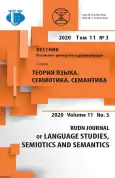Языковые нормы международных договоров
- Авторы: Алонцева Н.В.1, Ермошин Ю.А.1
-
Учреждения:
- Российский университет дружбы народов
- Выпуск: Том 11, № 3 (2020)
- Страницы: 532-544
- Раздел: КОГНИТИВНЫЕ ИССЛЕДОВАНИЯ В ЯЗЫКЕ
- URL: https://journal-vniispk.ru/2313-2299/article/view/323298
- DOI: https://doi.org/10.22363/2313-2299-2020-11-3-532-544
- ID: 323298
Цитировать
Полный текст
Аннотация
В предлагаемой статье обсуждаются особенности реализации языковых норм в международных договорах. Данная статья ставит цель - определить, какие лингвистические средства, присутствующие в текстах международной документации, т.е. в международных договорах, служат для того, чтобы зафиксировать заключаемые международные соглашения об установлении отношений и об их будущем регулировании. Материал исследования составили 1000 текстов международных договоров. Общий объем проанализированного фактического материала - свыше 6000 страниц. Методологическую основу исследования составили труды отечественных и зарубежных авторов по общей теории речевой деятельности, закономерностям восприятия и понимания речи и особенностям порождения высказывания, теории перевода, международному праву. Одним из важных способов предоставления информации в тексте является его лексическая композиция. Тексты международных договоров включают в себя различные виды лексики (общеупотребительная, терминологическая, специализированная и др.), которая выполняет тексто- и стилеобразующую функции. С точки зрения грамматики составление текстов международных договоров требует использования особых грамматических форм и категорий, синтаксических структур и видов словосочетаний. Природа текстов международных договоров подразумевает присутствие в них специализированных клише, присущих деловому стилю коммуникации. При подготовке и составлении текстов международных договоров адекватное использование соответствующей лексики и грамматических средств приводит к уменьшению неясностей и разночтений текстов этих документов.
Об авторах
Наталья Владимировна Алонцева
Российский университет дружбы народов
Автор, ответственный за переписку.
Email: alontseva_nv@rudn.university
доцент, доцент кафедры иностранных языков филологического факультета
ул. Миклухо-Маклая, 6, г. Москва, Российская Федерация, 117198Юрий Анатольевич Ермошин
Российский университет дружбы народов
Email: ermoshin_yua@rudn.university
доцент кафедры иностранных языков филологического факультета
ул. Миклухо-Маклая, 6, г. Москва, Российская Федерация, 117198Список литературы
- Shtreker, N.Yu. (2003). Russian language and culture of speech. Moscow: UNITY-DANA. (In Russ.).
- Vinokur, T.G. (1987). The use of language as the main subject of stylistics In Stylistics of the Russian language: Genre-communicative. aspect of the style of the text, V.N. Vinogradova, T.G. Vinokur, L.I. Eremin and others; A.N. Kozhin (Ed.). Moscow: Nauka. pp. 18-27. (In Russ.).
- Barlas, L.G. (1978). Russian language. Stylistics. Moscow: Prosveshhenie. (In Russ.).
- Petrishcheva, E.F. (1987). Functional and stylistic differentiation of speech In Stylistics of Russian language. Moscow. (In Russ.).
- Yartseva, V.I. (1981). Contrast grammar. Moscow: Nauka. (In Russ.).
- Kalyuzhnaya, V.V. (1982). Style of English documents of international organizations. Kiev: Naukova dumka. (In Russ.).
- Leontyev, A.A. (1999). Fundamentals of Psycholinguistics. Moscow: Nauka. (In Russ.).
- Lipatova, T.V. (2015). The formation of meaning and functional motivation of language units’ semantics. RUDN Journal of Language Studies, Semiotics and Semantics, 3, 17-25. (In Russ.).
- Luria, A.R. (1998). Language and consciousness. Moscow: Moscow Publishing House University. (In Russ.).
- Shcherba, L.V. (1974). Language system and language activity. Leningrad: Nauka. (In Russ.).
- Vygotsky, L.S. (1934). Thinking and Speech. Moscow-Leningrad: Sotsekgiz. (In Russ.).
- Zhinkin, N.I. (1964). About code transitions in internal speech. Topics in the study of language, 6, 26-38. (In Russ.).
- Zimnyaya, I.A. (2001). Linguopsychology of speech activity. Moscow-Voronezh: NPO MODEK. (In Russ.).
- Artemov, V.A. (1969). Psychology of teaching foreign languages. Moscow: Prosveshhenie. (In Russ.).
- Miller, G.A. & Johnson-Laird, P.N. (1976). Language and perception. Cambridge: Harvard Univ. Press.
- Rogozhnikova, T.M. (1988). The mechanisms of the functioning of the word in the individual consciousness: their specificity and sequence of formation In Psycholinguistic studies of the meaning of the word and understanding of the text: Interuniversity. topics Sat scientific tr. / Kalinin.gos. un-t; A.A. Zalevskaya (Ed.). Kalinin. pp. 15-22.
- Zalevskaya, A.A. (1982). Psycholinguistic problems of the semantics of the word. Kalinin. (In Russ.).
- Belyanin, V.P. (2001). Introduction to Psycholinguistics. Moscow: CheRo. (In Russ.).
- Barkhudarov, L.S. (1975). Language and translation: General and private translation theory. Moscow: Mezhdunarodnye otnoshenija. (In Russ.).
- Breus, E.V. (2002). Fundamentals of the theory and practice of translation from Russian into English. Moscow: Publishing house of the University RAE. (In Russ.).
- Guskova, T.I. & Ziborova, G.M. (2000). Difficulties in translating a socio-political text from English into Russian. Moscow: Rosspan. (In Russ.).
- Komissarov, V.N. (1990). Translation Theory: Linguistic aspects: Moscow: Vysshaja shkola. (In Russ.).
- Minyar-Beloruchev, R.K. (1991). About the principles of teaching foreign languages In General methodology of teaching foreign languages, A.A. Leontiev (Introduc.). Moscow: Russkij jazyk. pp. 43-53. (In Russ.).
- Shiryaev, A.F. Simultaneous translation. The activities of the simultaneous translator and the methodology of teaching simultaneous translation [Electronic resource]. URL: http://sch-yuri.narod.ru/transltn/shir.htm (accessed: 04.04.2020). (In Russ.).
- Druzhkov, M.P. (1986). The conclusion of international treaties within and under the auspices of international organizations. Kiev: Naukova dumka. (In Russ.).
- Evintov, V.I. (1981). Multilingual treaties in modern international law. Kiev: Naukova dumka. (In Russ.).
- Shuangling, Li (2019). Communicative significance of vague language: a diachronic corpus-based study of legislative texts. English for Specific Purposes, 53, 104-117.
- Lukashuk, I.I. (2001). Form of international treaties. Moscow: Spark, 2001. (In Russ.).
- Mataradze, L.N. (1971). Form of international treaty. Tbilisi: Metzniereba. (In Russ.).
- Paenson, I. (1983). Manual of the Terminology of Public International Law (peace) and International Organizations. Brussels.
- Talalaev, A.N. (1980). The law of international treaties. Moscow: Mezhdunarodnye otnoshenija. (In Russ.).
- Ulyanova, N.N. (1981). General multilateral treaties in modern international relations: Some issues. theories. Kiev: Naukova dumka. (In Russ.).
- De Vattel, E. (1960). The law of peoples or the principles of natural law applicable to the conduct and affairs of nations and sovereigns. Moscow. (In Russ.).
- Alontseva, N.V. & Tomashevich, S.B. (2012). Textual and linguistic norms of official documents. Russian Journal of Linguistics, 1, 33-38. (In Russ.).
- Boguslavsky, V.M. (1968). In defense of the business stamp. Russkaya Rech’, 6, 33-38. (In Russ.).
- Rosen, E.V. (1961). About some cliches of German spoken language. Foreign language at school, 4, 106-114. (In Russ.).
- URL: https://www.un.org/ru/sections/un-charter/preamble/index.html (accessed: 07.04.2020).
- URL: https://www.un.org/ru/documents/decl_conv/conventions/mines_convention.shtml (accessed: 07.04.2020).
- URL: https://www.un.org/en/ga/74/resolutions.shtml (accessed: 07.04.2020).
Дополнительные файлы









